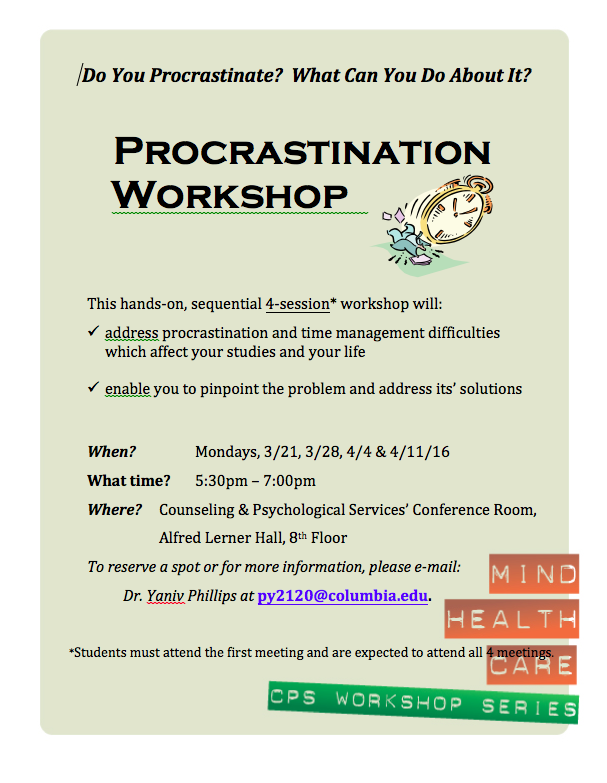Monthly Archives: February 2016
Sexual Respect Initiative – Requirement
REMINDER: You must complete the Sexual Respect Initiative participation requirements no later than March 20. Participation is a graduation requirement.
How to get started: Go to the Sexual Respect website to learn about and sign up for workshops, film screenings, online options, independent projects, and resources for healing and resilience. Check the FAQ for details.
Why sexual respect? Sexual respect is a commitment to communicating and acting with integrity and respect for others. The Sexual Respect and Community Citizenship Initiative asks all Columbia students to act, in ways most meaningful to you, to create this ethic of care in our own University community even amidst our differences, and to challenge sexual and gender-based misconduct at Columbia and beyond.
Questions? Email sexualrespect@columbia.edu. And check out the Office of University Life website for more ways to get involved.
Major Memo: Smoking Prohibition Policy
EVENT: Addressing Islamophobia
Addressing Islamophobia:
Dispelling Myths to Break Down BarriersMonday, Feb. 15 @ 5 p.m. | Lerner Hall C555 (2920 Broadway / 115 St.)Join us for an informative and interactive session about Islam and Islamophobia, featuring social justice educator and “hip-hop activist” Amer F. Ahmed, Ed. D.
Sponsored by the Office of University Life, Multicultural Affairs | Undergraduate Student Life, and the International Students and Scholars Office, withColumbia’s Muslim Students Association, and Turath, the Arab Students Association.
The event is free, but space is limited. To attend please register by Feb. 11 –http://bit.ly/ai215OMA. For more information visit http://bit.ly/CULisl.
@ColumbiaULife
Columbia University Life
Major Memo: University Travel Advisory – Zika Virus
Dear Students,
Columbia University is monitoring Centers for Disease Control and Prevention (CDC) and NYC Department of Health and Mental Hygiene advisories regarding Zika virus.
The CDC has posted an “Alert Level 2, Practice Enhanced Precautions,” for areas in the Caribbean, Central, and South America where Zika virus transmission is ongoing. (See map at:http://www.cdc.gov/zika/geo/) There have been reports of a serious birth defect of the brain called microcephaly and other poor pregnancy outcomes in babies of mothers who were infected with Zika virus while pregnant. Knowledge of the link between Zika and these outcomes is evolving, but until more is known, CDC recommends special precautions for the following groups:
- The CDC advises women who are pregnant to consider postponing travel to any area where Zika virus transmission is ongoing.
- For those women who are trying to become pregnant or who are thinking about becoming pregnant, the CDC recommends that they talk with their doctor about any travel plans to affected regions.
Zika virus is primarily transmitted through mosquitos. Anyone travelling to, or living in, areas with confirmed cases of Zika virus is, therefore, at risk for infection. Symptoms of Zika virus include rash, fever and joint pain. Only 20-30% of infected individuals will become symptomatic. The incubation period of the virus is unknown, but thought to be in the range of 3-12 days. There is currently no vaccination against Zika virus; treatment is aimed at relieving symptoms of infection and is not specific to Zika virus.
While there are three reported cases of Zika virus in New York City, these were all associated with travel to the affected region.
While no one is obligated to travel to an affected area on University business, those who do are strongly advised to adhere strictly to mosquito precautions:
- In contrast to other mosquito-related illnesses, where the highest risk of exposure tends to be at dawn and dusk, Zika has been reported to be contracted during daytime hours as well.
- Wear long-sleeved shirts and long pants.
- Stay in places with air conditioning or that use window and door screens to keep mosquitoes outside.
- Sleep under a mosquito bed net.
- Use Environmental Protection Agency (EPA)-registered insect repellents. All EPA-registered insect repellents are evaluated for effectiveness.
- Use permethrin-treated clothing and gear (such as boots, pants, socks, and tents). You can buy pre-treated clothing and gear, or treat them yourself.
Additional precautionary measures can be found here.
For more information on Zika virus, please visit: http://www.cdc.gov/zika/index.html




